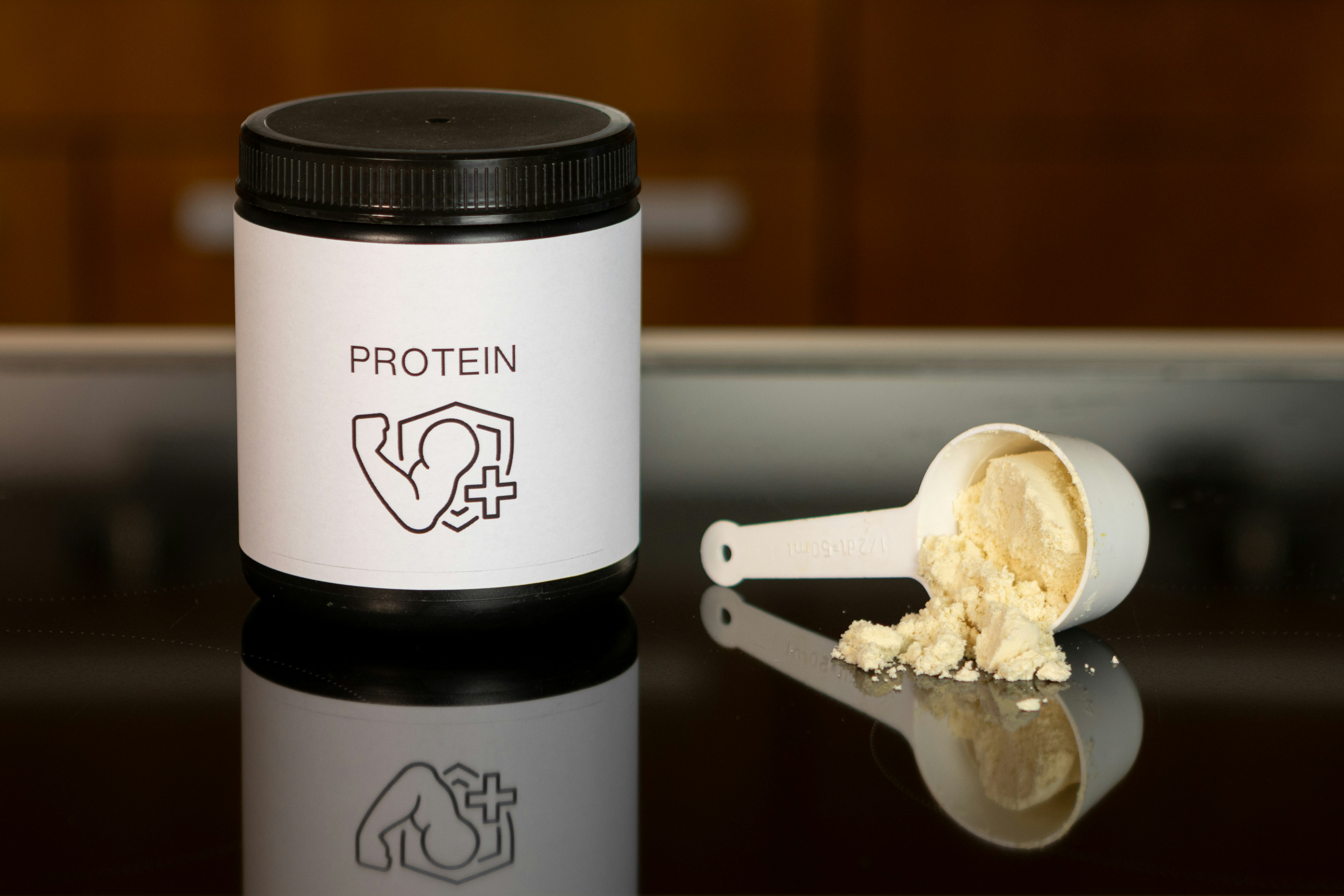Understanding Protein and Muscle Gain
Protein plays a pivotal role in the process of muscle gain, serving as a vital nutrient that supports both muscle repair and growth. When individuals engage in resistance training or intense physical activity, muscle fibers sustain microscopic tears. It is during the recovery phase that protein becomes essential, as it facilitates the repair of these fibers, contributing to muscle hypertrophy. The primary building blocks of protein, known as amino acids, are crucial for muscle protein synthesis—the process through which new muscle tissue is formed.
Amino acids can be classified into two categories: essential and non-essential. Essential amino acids cannot be synthesized by the body and must be obtained through dietary sources, making their intake particularly significant for those seeking to enhance muscle mass. Among these, branched-chain amino acids (BCAAs), which include leucine, isoleucine, and valine, have garnered considerable attention due to their role in stimulating muscle protein synthesis and reducing muscle soreness after exercise. This emphasizes the importance of a well-rounded protein intake to incorporate all essential amino acids for optimal muscle recovery and growth.
The recommended dietary allowance (RDA) for protein varies based on individual factors such as age, sex, weight, and physical activity levels. However, those aiming to gain muscle mass often benefit from higher protein intake, which can range from 1.6 to 2.2 grams of protein per kilogram of body weight, depending on their training intensity and goals. It is important to distribute protein consumption evenly throughout the day, particularly around workout periods, to maximize muscle repair and growth. Additionally, choosing high-quality protein sources like lean meats, dairy, legumes, and plant-based proteins ensures an adequate supply of essential amino acids required for effective muscle development.
Determining Your Protein Needs
Calculating the appropriate amount of protein for muscle gain is an essential aspect of any fitness regimen. Individual protein requirements can vary significantly based on factors such as age, sex, weight, activity level, and specific fitness goals. To ensure optimal muscle development, it is important to take these variables into account.
Firstly, a common recommendation is to consume 1.6 grams to 2.2 grams of protein per kilogram of body weight per day. For those engaging in regular intense exercise or strength training, aiming for the higher end of this range may be beneficial. Conversely, less active individuals may find that approximately 1.2 grams to 1.6 grams per kilogram is adequate. Individuals should also be aware that their protein needs might increase with age due to anabolic resistance, which may necessitate adjustments to their dietary intake.
To determine your specific protein needs, start by weighing yourself in kilograms. Next, assess your activity level: sedentary individuals, moderate exercisers, and intense athletes will have different requirements. Using the aforementioned guidelines will help you establish a foundational protein intake. Additional considerations may include your overall dietary composition, as well as protein timing, which could impact muscle protein synthesis.
Several reputable health organizations, such as the American College of Sports Medicine and the International Society of Sports Nutrition, provide guidelines on protein intake. They suggest that individuals focused on muscle gain incorporate a source of protein in every meal and snack throughout the day. Overall, it is crucial to craft a balanced dietary plan, ensuring that protein sources are varied and include lean meats, dairy, legumes, and plant-based proteins.
Recommended Daily Allowance (RDA) vs. Protein Requirements for Muscle Gain
Protein is an essential nutrient required for various bodily functions, including muscle growth and repair. The Recommended Daily Allowance (RDA) for protein typically suggests a daily intake of 0.8 grams per kilogram of body weight for the average adult. This guideline is primarily intended to prevent deficiencies in the general population and may not sufficiently address the specific demands of individuals engaged in strength training or bodybuilding.
For those actively participating in resistance training, studies indicate that protein requirements are substantially elevated. The focus keyword, “protein needs,” becomes particularly relevant here, as professionals commonly recommend an intake ranging from 1.6 to 2.2 grams per kilogram of body weight to maximize muscle synthesis. This increased requirement caters to the heightened metabolic stress placed on the body during intense workouts, necessitating additional protein consumption for optimal recovery and growth.
Furthermore, it is important to differentiate between the RDA and the requirements specifically tailored for muscle gain. Individuals focused on bodybuilding or intense strength training may not only need greater quantities of protein but also comprehensive meal planning to distribute protein intake throughout the day. This can further enhance muscle recovery and growth, making knowledge of individual protein needs crucial for those looking to increase their strength and muscle mass.
As a result, athletes and fitness enthusiasts must evaluate their dietary protein sources and adapt them accordingly to meet these higher demands effectively. While the RDA is a vital benchmark for general health, those seeking significant muscle gains should be prepared to adjust their protein intake upward, ensuring they provide their body with the necessary nutrients to support their physical ambitions.
Types of Protein Sources
Protein is a vital nutrient that supports muscle gain and overall health, and it comes from a variety of sources. These sources can be broadly categorized into two main types: animal-based proteins and plant-based proteins. Each category contributes unique benefits to an individual’s diet.
Animal-based proteins are complete proteins, meaning they contain all nine essential amino acids that the body cannot produce on its own. Common sources in this category include meats such as chicken, beef, and fish, as well as dairy products like milk, cheese, and yogurt. Eggs are another excellent source of high-quality protein, offering a convenient option for many. These animal-derived proteins are particularly beneficial for muscle growth, as they promote effective recovery and repair of muscle tissue after intense workouts.
On the other hand, plant-based proteins include legumes (such as beans, lentils, and peas), nuts, seeds, and whole grains. Unlike animal proteins, many plant proteins are considered incomplete, meaning they may lack one or more essential amino acids. However, by combining various plant sources, such as rice and beans or nut butter on whole grain bread, individuals can achieve a complete amino acid profile. This approach is particularly important for vegetarians and vegans who rely on plant-based protein options for their muscle-building needs.
Furthermore, the digestibility and rate of absorption of protein can differ among these sources. Animal proteins typically offer higher levels of bioavailability, allowing the body to utilize them more efficiently. Conversely, many plant proteins may require careful planning to ensure adequate intake and amino acid balance. Understanding these distinctions is crucial for making informed dietary choices to support muscle gain effectively.
Timing Your Protein Intake for Maximum Benefits
The timing of protein intake plays a crucial role in maximizing muscle gain and recovery. It is essential to distribute protein consumption evenly throughout the day rather than consuming it in a single meal. Research indicates that spreading protein intake across multiple meals can optimize muscle protein synthesis, which is vital for growth and recovery. This approach allows for a consistent supply of amino acids, the building blocks of protein, to the muscles, enhancing their ability to repair and grow after exercise.
In particular, the consumption of protein post-workout is often highlighted as a key factor in achieving optimal muscle recovery. After engaging in resistance training, the muscles are primed to absorb nutrients, making this an ideal time to provide them with the necessary building blocks. It is recommended to consume a protein-rich meal or supplement within a window of approximately 30 minutes to two hours after exercise. Doing so can stimulate muscle protein synthesis at a greater rate than if protein intake were delayed.
Moreover, meal frequency can be tailored to individual preferences and lifestyles but should ideally involve consuming protein-rich foods every three to five hours. For athletes or individuals engaged in intense training, aiming for around 20-30 grams of protein per meal is generally advisable. Such a strategy not only supports muscle growth but also helps in minimizing muscle breakdown, especially during calorie deficits or weight loss phases.
Incorporating a variety of protein sources, such as lean meats, dairy, legumes, and plant proteins, can enhance overall protein quality and digestibility. Therefore, understanding the significance of nutrient timing, alongside total daily protein intake, can be pivotal in achieving effective muscle gain and recovery.
The Role of Supplements in Protein Intake
Protein supplements have gained popularity in recent years due to their convenience and effectiveness in supporting muscle gain. Among the various types of protein powders available, whey, casein, and plant-based options stand out as the most commonly used. Whey protein, derived from milk, is known for its quick absorption rate and complete amino acid profile, making it an excellent choice for post-workout recovery. Casein, also a milk derivative, is absorbed more slowly and may be beneficial for muscle repair during periods of fasting, such as overnight.
Plant-based protein powders, including those made from peas, rice, and hemp, are ideal for individuals seeking a vegan or lactose-free alternative. These supplements provide a valuable source of protein and are often combined to ensure a comprehensive amino acid profile. Incorporating protein supplements into one’s diet can be especially useful for those who struggle to meet their protein requirements through whole foods alone. This is particularly prevalent among athletes, bodybuilders, and those with increased protein needs.
However, there are important considerations to keep in mind when using protein supplements. For instance, while they can help bridge dietary gaps, over-reliance on supplements could lead to insufficient intake of whole foods, which provide essential vitamins, minerals, and other nutrients necessary for overall health. Additionally, individuals with specific dietary restrictions, allergies, or pre-existing health conditions should consult with a healthcare professional before integrating protein powders into their regimen.
In conclusion, protein supplements can be a valuable addition to a muscle gain strategy when used correctly. Whether choosing whey, casein, or plant-based protein, understanding the benefits and potential downsides can help individuals make informed decisions about their protein intake.
Signs of Insufficient Protein Intake
Recognizing the signs of insufficient protein intake is crucial for those aiming to achieve muscle gain and overall health. One of the most noticeable physical signs is muscle weakness or loss of muscle mass, which can significantly hinder progress in strength training. A lack of protein can lead to the body utilizing muscle tissue for energy, adversely affecting muscle growth and recovery after workouts. Furthermore, individuals may experience a decline in exercise performance, manifested as reduced stamina, increased fatigue, and longer recovery times. As the body struggles to repair damaged tissues, workouts may become less effective, leading to frustration and demotivation.
Another indication of inadequate protein consumption can be found in an individual’s healing process. Protein plays a vital role in tissue repair, and insufficient intake may result in slower recovery from injuries or post-exercise soreness. Additionally, skin, hair, and nail health can be negatively impacted; brittle nails, thinning hair, and skin issues can arise, indicating that the body is not receiving sufficient building blocks to maintain these vital structures.
On a mental level, low protein intake can contribute to feelings of fatigue or lethargy. Proteins are essential for neurotransmitter function, which can influence mood and cognitive abilities. Individuals may find themselves experiencing increased irritability, difficulty concentrating, or fluctuations in energy levels, all of which can detract from overall well-being. Moreover, frequent cravings for food, particularly for carbohydrates, can occur when the body is deprived of adequate protein, leading to unhealthy eating habits.
Ultimately, recognizing these signs and addressing protein deficiency is essential for achieving desired muscle gain and maintaining overall health. By ensuring adequate protein intake, individuals will support both their physical and mental wellness, paving the way for success in their fitness endeavors.
Adjusting Your Protein Needs as You Progress
As individuals embark on their fitness journey, it is crucial to recognize that protein requirements are not static; they evolve based on various factors related to training and personal goals. Initially, most newcomers to resistance training may find that a moderate level of protein intake, around 1.6 grams per kilogram of body weight, suffices to support muscle gain and recovery. However, as one’s experience and intensity increase, it is essential to reassess these protein needs.
One significant factor that necessitates adjustments in protein consumption is the increase in workout intensity. As individuals build strength and engage in more strenuous training regimes, their muscles undergo additional stress, leading to a higher rate of protein synthesis and breakdown. Consequently, it is advisable for these individuals to increase their protein intake to approximately 1.8 to 2.2 grams per kilogram of body weight, especially if they aim to optimize muscle growth and recovery.
Moreover, specific goals such as cutting body fat while preserving lean muscle mass can influence protein requirements. During a caloric deficit, higher protein intake becomes paramount to maintain muscle tissue. Therefore, adjusting protein goals to the higher end of the spectrum can be advantageous during periods of weight loss, ensuring that the body has adequate amino acids available for recovery and performance.
Lastly, changes in body composition also play an essential role in determining protein needs. As individuals gain muscle or lose fat, recalibrating their protein intake can support these physiological changes, facilitating further improvements in overall fitness. It is advisable to periodically review one’s dietary protein amounts throughout their fitness journey to ensure they align with evolving training demands and personal objectives.
Conclusion and Best Practices
In summary, understanding the appropriate protein intake for muscle gain is crucial for anyone looking to enhance their physical performance and achieve their fitness goals. Throughout our discussion, we have highlighted the importance of protein as a vital macronutrient, essential for muscle repair, growth, and overall body composition. On average, individuals aiming to build muscle should consume approximately 1.6 to 2.2 grams of protein per kilogram of body weight daily. This range can vary based on factors such as age, activity level, and training intensity.
Moreover, it is essential to incorporate high-quality protein sources into your diet, such as lean meats, fish, dairy products, legumes, and plant-based proteins. These sources not only provide necessary amino acids but also contribute other essential nutrients that support overall health. Timing your protein intake around workouts—within a couple of hours before and after exercising—can further enhance muscle recovery and growth.
To optimize protein intake, it is advisable to distribute your protein consumption evenly across meals. Aim for 20 to 30 grams of protein per meal to maximize muscle protein synthesis. Additionally, consider the benefits of seeking professional guidance from a registered dietitian or a nutritionist who can help tailor a dietary plan specific to your needs and goals. Finally, monitoring your progress and adjusting your protein consumption based on results can lead to more effective muscle gain.
In conclusion, by following these best practices and understanding your individual protein requirements, you can create a well-rounded approach to nutrition that fosters muscle growth and improves your overall fitness journey. Prioritize protein intake while maintaining a balanced diet, and stay consistent with your training efforts for optimal results.



